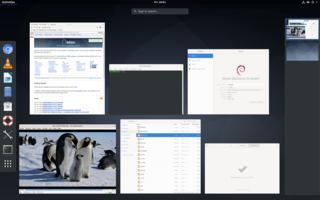Related Research Articles

Debian, also known as Debian GNU/Linux, is a Linux distribution composed of free and open-source software and proprietary software developed by the community-supported Debian Project, which was established by Ian Murdock on August 16, 1993. The first version of Debian (0.01) was released on September 15, 1993, and its first stable version (1.1) was released on June 17, 1996. The Debian Stable branch is the most popular edition for personal computers and servers. Debian is also the basis for many other distributions, like PureOS, Ubuntu, Pardus, and Linux Mint.

The GNU Compiler Collection (GCC) is an optimizing compiler produced by the GNU Project supporting various programming languages, hardware architectures and operating systems. The Free Software Foundation (FSF) distributes GCC as free software under the GNU General Public License. GCC is a key component of the GNU toolchain and the standard compiler for most projects related to GNU and the Linux kernel. With roughly 15 million lines of code in 2019, GCC is one of the biggest free programs in existence. It has played an important role in the growth of free software, as both a tool and an example.

The GNU Debugger (GDB) is a portable debugger that runs on many Unix-like systems and works for many programming languages, including Ada, Assembly, C, C++, D, Fortran, Haskell, Go, Objective-C, OpenCL C, Modula-2, Pascal, Rust, and partially others.

The GNU Project is a free software, mass collaboration project announced by Richard Stallman on September 27, 1983. Its goal is to give computer users freedom and control in their use of their computers and computing devices by collaboratively developing and publishing software that gives everyone the rights to freely run the software, copy and distribute it, study it, and modify it. GNU software grants these rights in its license.
A cross compiler is a compiler capable of creating executable code for a platform other than the one on which the compiler is running. For example, a compiler that runs on a PC but generates code that runs on an Android smartphone is a cross compiler.
The GNU C Library, commonly known as glibc, is the GNU Project's implementation of the C standard library. It is a wrapper around the system calls of the Linux kernel for application use. Despite its name, it now also directly supports C++. It was started in the 1980s by the Free Software Foundation (FSF) for the GNU operating system.
OpenRISC is a project to develop a series of open-source hardware based central processing units (CPUs) on established reduced instruction set computer (RISC) principles. It includes an instruction set architecture (ISA) using an open-source license. It is the original flagship project of the OpenCores community.

μClinux is a variation of the Linux kernel, previously maintained as a fork, that targets microcontrollers without a memory management unit (MMU). It was integrated into the mainline kernel as of 2.5.46; the project continues to develop patches and tools for microcontrollers. The homepage lists Linux kernel releases for 2.0, 2.4 and 2.6.
The GNU Assembler, commonly known as gas or as, is the assembler developed by the GNU Project. It is the default back-end of GCC. It is used to assemble the GNU operating system and the Linux kernel, and various other software. It is a part of the GNU Binutils package.
Newlib is a C standard library implementation intended for use on embedded systems. It is a conglomeration of several library parts, all under free software licenses that make them easily usable on embedded products.
Technical variations of Linux distributions include support for different hardware devices and systems or software package configurations. Organizational differences may be motivated by historical reasons. Other criteria include security, including how quickly security upgrades are available; ease of package management; and number of packages available.

Loongson is the name of a family of general-purpose, MIPS architecture-compatible microprocessors, as well as the name of the Chinese fabless company that develops them. The processors are alternately called Godson processors, which is described as its academic name.
V850 is a 32-bit RISC CPU architecture produced by Renesas Electronics for embedded microcontrollers. It was designed by NEC as a replacement for their earlier NEC V60 family, and was introduced shortly before NEC sold their designs to Renesas in the early 1990s. It has continued to be developed by Renesas as of 2018.

Linux is a family of open-source Unix-like operating systems based on the Linux kernel, an operating system kernel first released on September 17, 1991, by Linus Torvalds. Linux is typically packaged as a Linux distribution (distro), which includes the kernel and supporting system software and libraries, many of which are provided by the GNU Project. Many Linux distributions use the word "Linux" in their name, but the Free Software Foundation uses and recommends the name "GNU/Linux" to emphasize the use and importance of GNU software in many distributions, causing some controversy.

The Linux kernel is a free and open-source, monolithic, modular, multitasking, Unix-like operating system kernel. It was originally written in 1991 by Linus Torvalds for his i386-based PC, and it was soon adopted as the kernel for the GNU operating system, which was written to be a free (libre) replacement for Unix.

Debian releases do not follow a fixed schedule. Recent releases have been made around every two years by the Debian Project. The most recent version of Debian is Debian version 12, codename "Bookworm". The next up and coming release of Debian is Debian 13, codename "Trixie".
Intel MPX are discontinued set of extensions to the x86 instruction set architecture. With compiler, runtime library and operating system support, Intel MPX claimed to enhance security to software by checking pointer references whose normal compile-time intentions are maliciously exploited at runtime due to buffer overflows. In practice, there have been too many flaws discovered in the design for it to be useful, and support has been deprecated or removed from most compilers and operating systems. Intel has listed MPX as removed in 2019 and onward hardware in section 2.5 of its Intel® 64 and IA-32 Architectures Software Developer's Manual Volume 1.

Buildroot is a set of Makefiles and patches that simplifies and automates the process of building a complete and bootable Linux environment for an embedded system, while using cross-compilation to allow building for multiple target platforms on a single Linux-based development system. Buildroot can automatically build the required cross-compilation toolchain, create a root file system, compile a Linux kernel image, and generate a boot loader for the targeted embedded system, or it can perform any independent combination of these steps. For example, an already installed cross-compilation toolchain can be used independently, while Buildroot only creates the root file system.
Advanced Matrix Extensions (AMX), also known as Intel Advanced Matrix Extensions, are extensions to the x86 instruction set architecture (ISA) for microprocessors from Intel designed to work on matrices to accelerate artificial intelligence (AI) and machine learning (ML) workloads.
References
- ↑ Simon Sharwood (3 April 2018). "Linux 4.16 arrives, erases eight CPUs and keeps melting Meltdown". theregister.co.uk. Situation Publishing. Archived from the original on 3 April 2018. Retrieved 3 April 2018.
- ↑ GCC (15 Jun 2023). "GCC 12 Release Series: Changes, New Features, and Fixes". gcc.gnu.org. Situation Publishing. Archived from the original on 15 Jun 2023. Retrieved 15 Jun 2023.